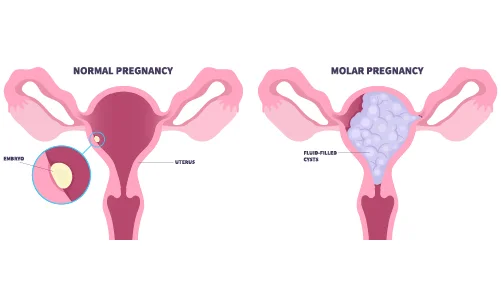Molar pregnancy, a rare condition, occurs when abnormal tissue forms in the uterus instead of a viable foetus. Complications include vaginal bleeding, severe nausea, and potential development of gestational trophoblastic neoplasia, requiring surgical removal and chemotherapy for treatment.
If you're considering treatment for molar pregnancy, reach out to us or book a direct appointment with our Molar Pregnancy doctor. At the CK Birla Hospital, we are dedicated to ensuring that your molar pregnancy treatment is as safe, comfortable, and effective as possible. We're here to guide you every step of the way toward a successful recovery.

Molar pregnancy can be caused by various factors, including:
It’s crucial for early detection and management through regular prenatal care, allowing for appropriate treatment and follow-up care to ensure the woman’s health and well-being.
Untreated molar pregnancies pose significant risks, such as:
Timely medical intervention is vital. It ensures proper management, lowers complication risks and enhances patient outcomes. Immediate medical attention is crucial for symptoms like vaginal bleeding or severe nausea.
Molar pregnancies are divided into two distinct types: complete and partial.
Complete Molar Pregnancy
Complete molar pregnancies result from a sperm fertilising an unfertilized egg, preventing embryo development. Abnormal placental tissue with fluid-filled cysts forms, producing pregnancy hormone HCG. Despite no viable embryo, HCG production can mimic pregnancy symptoms and yield positive test results.
Partial Molar Pregnancy
A partial molar pregnancy is distinguished by the formation of an abnormal placenta alongside an embryo, where two sperm fertilise a single egg. In such instances, the developing embryo possesses an additional set of chromosomes. Although the embryo may initiate development, its ability to survive is generally compromised.
The cost of a molar pregnancy treatment varies as per the specific type of treatment advised by a healthcare provider, such as:
The cost can also vary widely depending on several factors, including the location, the extent of the treatment, the doctor’s experience, and the hospital’s pricing structure.
To get an explicit estimate for the cost of a molar pregnancy treatment at the CK Birla Hospital, contact the hospital directly. Additionally, you can consult with our board-certified gynaecologist to discuss your specific needs and receive a personalised quote for the treatment.
Before treatment, diagnosing a molar pregnancy involves these steps:
A molar pregnancy, also known as gestational trophoblastic disease (GTD), is an abnormality of the placenta where a non-viable fertilised egg implants in the uterus. It results in abnormal tissue growth instead of a normal foetus.
Symptoms include vaginal bleeding, severe nausea and vomiting, rapid uterine growth, high blood pressure, and the presence of grape-like clusters in the uterus.
Yes, most women who have had a molar pregnancy can become pregnant again. However, it’s essential to wait until cleared by a healthcare provider, and close monitoring is often recommended during subsequent pregnancies.